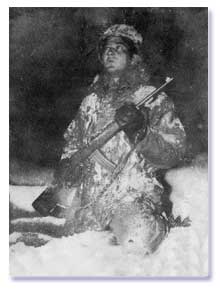Dear Lynnita,
I was a corpsman assigned to the 1st Marines and ended up in Easy Company, 1st Medical Battalion. I was
transferred to Fox company, 2nd Battalion, 7th Marines just prior to being shipped home.
I was in Korea from August of 1951 to March of 1952. Strange, I remember very little and have no idea of any
village nearby. The big battle at that time for us was the Punch Bowl. The Marines took so many casualties. They
kept pouring in by the hundreds. Serious wounds were helicoptered out and I believe to a rear echelon hospital
like MASH. Artillery was behind us and in front of us and going steady night and day; heavy equipment like tanks
moved by at night. An artillery outfit behind us was hit by infiltrators and I treated two (both died from head
injuries). They were with the National Guard.
I believe the 1st Marines shot down a Navy Corsair that was all screwed up and strafing and bombing them. I
carried out the pilot. In fact, I got his .45 pistol. He was injured, but survived.
There was so much going on in such a short period of time. I dreaded treating the young guys that stepped on
mines. Their legs were in shambles. One young guy had a flare imbedded in his buttocks and he was so badly
burned. I couldn’t eat pork for twenty years because of it. Head wounds were also tough. We just transferred
them out FAST mostly by helicopter. Chest wounds and belly wounds were also transferred out fast. I had belly
wounds, for I had too many die waiting for a copter.
There was a staff of doctors doing surgery in a tent. Their tables were made fm rough lumber. They did only
amputees and chest and belly wounds. They were swamped and couldn’t handle but a few. The doctors were like
gods, for they saved what they could.
I recall sliding in blood so thick on the ground that it was hard to stand up. The one thing I did notice is
that few cried or showed pain. All were more or less in shock, and naturally, under morphine.
We had a field around the size of a football field loaded with wounded. I went through to search for serious
wounded. I came across a major in the Marines that was hit hard in many places. He refused to be pulled out
before his men. I took him anyway, and I believe he made it. I also gave a Chinese prisoner artificial
resuscitation. He died on me, but he came back and was fine. I then had him following me all over the place for
he was so grateful.
During this melee, on the same field where the major lay, a Catholic priest came over and had a purple cloth
around his neck. He gave services to all these wounded. Well, can you imagine this scene with the priest raising
his arms and all the wounded around him and just then the clouds opened up and the sun broke through. A beam of
light came down from the heavens and lit the whole field. To this day, I believe I met the Lord. All of this
happened during the Punch Bowl battle.
There was so much more, but it comes back to me in pieces, a little at a time. Try feeling and grouping dead
and wounded at night time to determine if they are alive or dead, head wounds, belly wounds, chest wounds, or
amputees. Head wounds you knew, for their heads were so swelled. Chest wounds by air coming out of the chest,
belly wounds by the harness of the belly, amputees by the large amount of thick blood and feeling bones below
the waist. The dead were easily identified by stiffness or coldness. I usually could identify the dead in the
daytime by the position of their feet (don’t ask me why).
It was tough to sit with guys hit hard, and to wait for a copter to take them out or get them into a doctor’s
tent for surgery. Some made it and others just died sitting there.
To this day, I have a tough time with myself. I often wonder how I’ll be judged after my passing. Did I do
enough or not enough? Did I try to live too much and allowed my friends to die? Am I a coward? All these things
bother me. You’re the first and last I’ll ever tell this to. There were so many that had it a thousand times
worse than me, and so it’s hard for me to talk about it.
The first Marine I saw die was a tall red head from Texas. He stepped on a mine on patrol prior to the Punch
Bowl battle. There are a lot of patrols, artillery and mine casualties prior to a battle. You know one is coming
because of the artillery and patrols.
That’s about it, except I did treat a young Marine from my home town that won the Navy Cross. His buddy with
him received the Congressional Medal of Honor. The buddy of his died in battle. I believe his name was Veltori
and from the east coast. Lyle Conaway, the one from my home town, and I are friends to this day."




